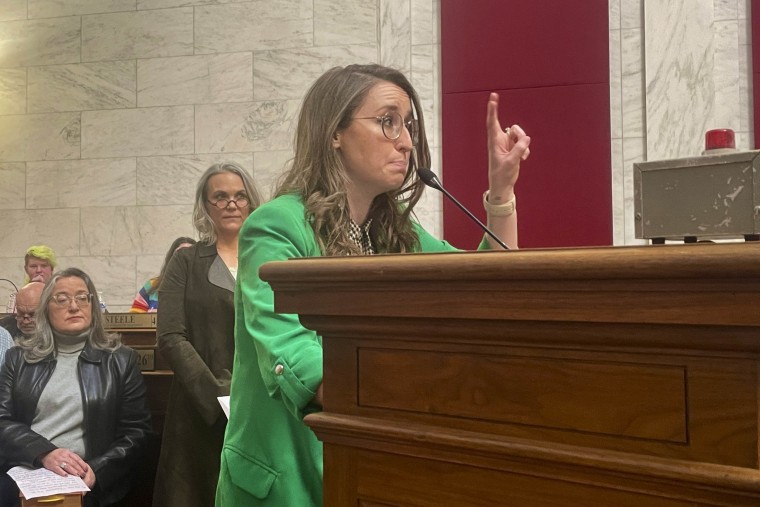National LGBTQ group sues Texas after state AG demands records about trans youths
Texas Attorney General Ken Paxton faces a lawsuit after he demanded an LGBTQ group turn over all records related to its support of Texas families seeking transition-related medical care for their transgender youths.
PFLAG, a national group that supports the families of LGBTQ people, sued Paxton on Wednesday night, calling his demand “a clear and unmistakable overreach” in retaliation for two other lawsuits PFLAG is involved in regarding minors’ access to gender-affirming care in the state.
Paxton’s demand for the records, the group said, is part of the state’s “relentless campaign to persecute Texas trans youth and their loving parents.”
The PFLAG lawsuit asks Travis County District Court to issue a temporary restraining order against the attorney general’s office and to permanently block Paxton’s demand, alleging it violates PFLAG’s and its members’ “rights to freedom of petition, speech and assembly and to be free from unjustified searches and seizures.”
“This mean-spirited demand from the Attorney General’s Office is petty and invasive, which is why we want the court to put an end to it,” Brian K. Bond, the CEO of PFLAG National, said in a statement.
“Across races, places, and genders, our families and communities are stronger when we are free to come together,” Bond said. “PFLAG National, our chapters, and our entire community will continue leading with love as we have for the last five decades, providing support, education, and advocacy to ensure every LGBTQ+ person in Texas and beyond is safe, celebrated, empowered, and loved.”
Paxton did not immediately respond to a request for comment.
Paxton’s office served a demand letter on PFLAG on Feb. 9 to hand over records related to a sworn statement Bond made in Loe v. Texas, a lawsuit PFLAG is involved in against SB 14, a state law barring gender-affirming medical care for minors.
In another demand letter included in PFLAG’s latest lawsuit, Paxton’s office said the records were related to its “investigation of actual or possible violations” of the Texas Deceptive Trade Practices-Consumer Protection Act. His office said it was specifically investigating allegations of “misrepresentations regarding Gender Transitioning and Reassignment Treatments and Procedures and Texas law.”
The demand letters request all documents and communications related to parts of Bond’s affidavit in Loe v. Texas, including a part where he says PFLAG families have had to develop “contingency plans” in case they lose access to care, such as moving out of the state. The demand letters also request communications and chapter meeting minutes related to Bond’s statement that PFLAG families have asked Texas chapters for “alternative avenues to maintain care in Texas.”
Paxton’s office also requested “all recommendations, referrals, and/or lists of pediatric and/or ‘health care providers’ in Texas that PFLAG (or any of its representatives) has created, maintained, received or distributed since March 8, 2023.”
The Texas Supreme Court allowed SB 14 to take effect on Sept. 1 while the Loe v. Texas case continues.
PFLAG said in its suit that Paxton is trying to go around the process for presenting evidence in Loe v. Texas and PFLAG v. Abbott, the group’s other lawsuit, which aims to prevent the state from investigating members who have been suspected of providing their trans children with gender-affirming care.
Through the demands, the attorney general’s office “seeks to circumvent the normal discovery process along with its attendant protections, and in so doing, seeks to chill the ability of PFLAG and its members to exercise their free speech and associational rights and avail themselves of the courts when their constitutional rights are threatened,” PFLAG said in its new lawsuit.
Paxton’s request for records from PFLAG is the latest development in years of efforts by his office and other state officials to restrict access to transition-related care for minors. In February 2022, after the Legislature failed to pass a law banning such care, Paxton issued a nonbinding legal opinion declaring gender-affirming medical care, including puberty blockers, hormone therapy and surgery, child abuse under existing state law.
Republican Gov. Greg Abbott then directed the public and licensed professionals to report parents suspected of providing such care to their minor children to the Department of Family and Protective Services. Shortly afterward, the department opened its first investigation into one of its own employees with a trans child and then opened investigations into at least eight other families.
PFLAG, among other LGBTQ legal organizations, filed PFLAG v. Abbott in June 2022 to stop investigations into its members. In September, a judge blocked the department from investigating PFLAG members. Paxton appealed the decision, which remains in effect as the suit continues.
On Friday, Texas Health and Human Services will put a new rule into effect restricting gender-affirming care for adults on Medicaid. The rule will prohibit Medicaid coverage of “hormonal therapy agents” for any adult who has been diagnosed with gender dysphoria within the last 730 days.


